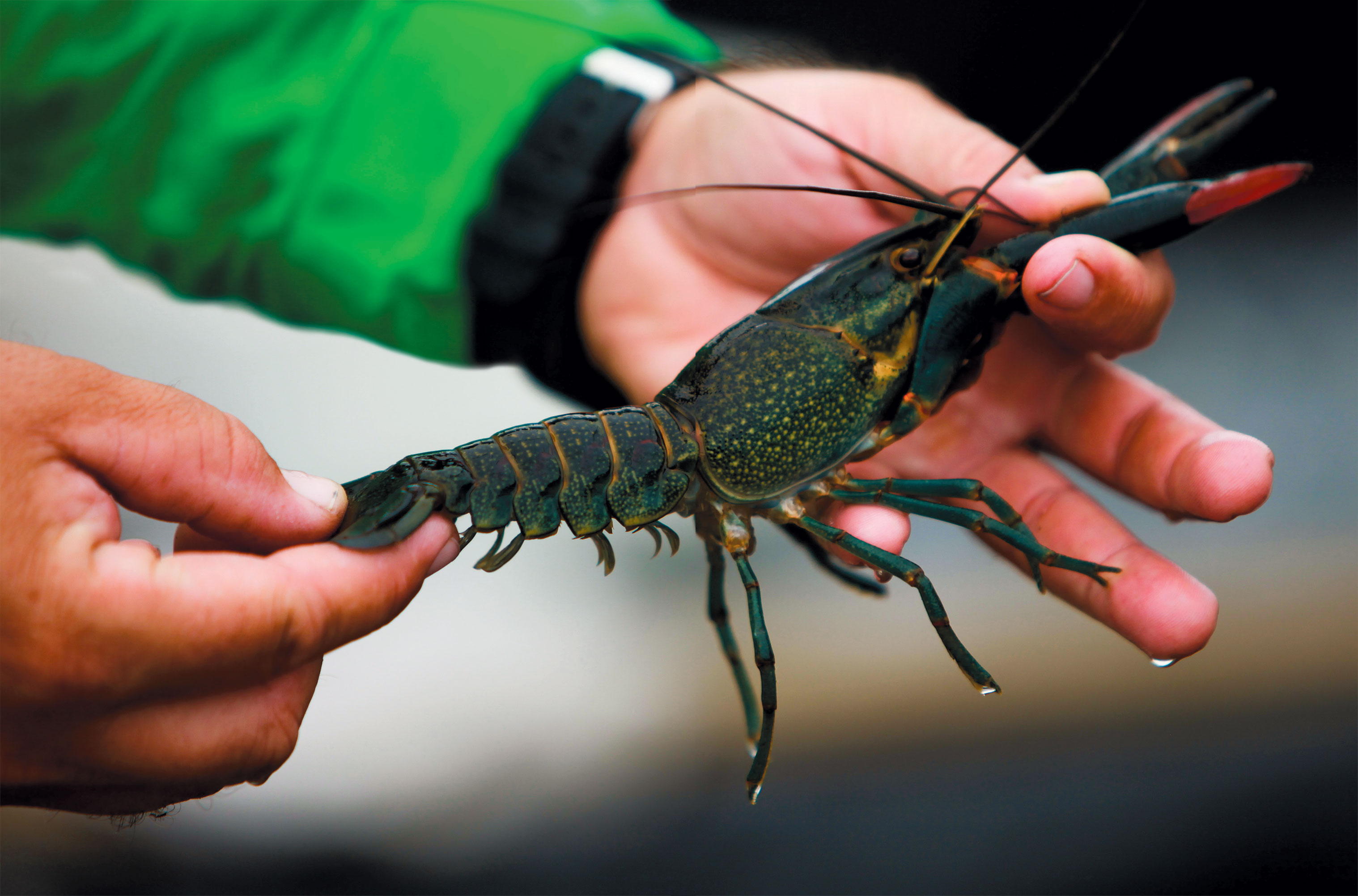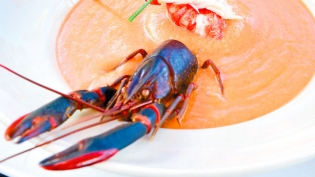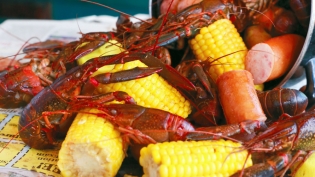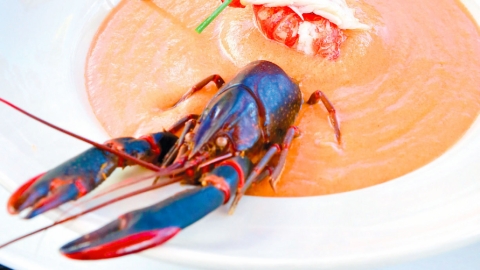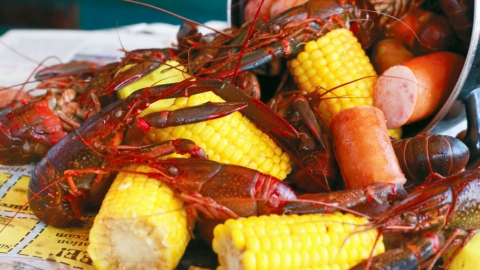Short Claws, Big Taste: Red Claw Crayfish at West Coast Aqua Farms
Cindy Amaro’s eyes tear up as she recounts her family’s journey from poverty in communist Cuba to agricultural bounty in America.
Her husband, Noel, fled Matanzas for Miami at age 19 in 1994, arriving in Florida by makeshift raft after eight days, starving and grateful. Her parents, who hailed from Camaguey and Cabaiguan, soldiered to provide a safe upbringing for her in the United States.
Cindy and Noel fell in love young in Miami, and today they have three children, a thriving aqua farm, and an abundance of nutritious food. They know what good fortune means, and that humility informs their burgeoning business as independent farmers and purveyors.
“If you have a dream, you can make it happen,” Cindy Amaro says. “We are proof of that.”
Their realized dreams are West Coast Aqua Farms in North Port and West Coast Farmers’ Market in Venice. Three years ago, the Amaros turned their three-acre property into a fully integrated aquaponic farm, and on August 8 they launched a public store about 25 minutes away in which to sell their harvests. (Previously, they had only marketed their inventory to area restaurants.)
One of their biggest niches is breeding freshwater blue-hued Australian red claw crayfish, often called “mini lobsters,” which have a flavor sweeter than saltwater lobsters and are lower in sodium, fat, and cholesterol. These crustaceans are also cheaper, as five to six crayfish usually comprise a $10 pound. The Amaros make two deliveries of the crayfish each day from the farm to the store and sell about 30 pounds every 24 hours.
“Once people taste these, they can’t stop ordering them,” Cindy Amaro says. “When we first started, we thought we’d just farm tilapia but we found something different but still affordable, and people really love them.”
To cultivate their crayfish and crops, the Amaros use an ancient system called aquaponics, which combines aquaculture (fish farming) with hydroponics (growing plants with water and nutrients). The concept dates back to the Aztecs, and it creates a natural mini ecosystem that is cost effective and chemical free.
Noel Amaro constructed the North Port compound in two years, drawing from his multi-generational farming roots, and it is as innovatively engineered as it is Earth friendly. The Amaros relocated from Miami to North Port a decade ago to live more simply, and now the Amaro children (Cristina, 10; Carolina, 9; and Ruben, 8) are experiencing the benefits of eating right out of their backyard.
So, how does this backyard ecosystem operate? It is all a bit esoteric, of course, and finding the formula was an arduous process of trial and error for the Amaros. As soon as they hit the jackpot combination for optimal growth and production, they knew they were onto something groundbreaking.
The anchor is the pond, which was a natural formation on the property when the Amaros purchased their North Port home. They filled it with plant life, koi, and tilapia, and the pond now collects rainwater that is pumped into 48 red claw tanks (102 by 122 feet and two feet deep) in a greenhouse shelter.
That water is filtered and circulated through a network of PVC pipes that drip onto a cornucopia of vegetables. Plants are grown in rows of neatly stacked pots (no digging in the dirt here) and 300,000 red claws are held in fungicide- and pesticide-free tanks. The wastewater from the tanks goes back into the pond to replenish it, and that water fertilizes the plants. Vegetables in the pots consume the nitrates produced by the bacteria in the red claw tanks, which completes the cycle of cleaning the water. The crayfish even eat the outer leaves of the farm’s greens, so there is truly zero waste.
The Amaros water their crops for two minutes three times a day, and it takes 26 days for a seed to grow into a head of baby romaine lettuce, Cindy Amaro says. During harvesting season, the farm employs eight additional workers. Though the farm isn’t certified organic, the Amaros do not use any genetically modified seeds or chemicals, as they would unbalance the system and harm the red claws and plants.
“My husband did all this,” Cindy Amaro says while giving a tour of the farm. “He built everything from the ground up and it was so much work. It took a long time before we figured out what worked.”
The farm may only be three acres large but because of its vertical plant stacks, its span is equivalent to 20 acres. About 150,000 edibles are produced here, such as broccoli, radishes, lettuce, carrots, cauliflower, squash, basil, cilantro, and arugula.
Reusable shredded coconut, which is shipped in from Germany and combined with worm castings, is used instead of soil to retain moisture even during Florida summers. This gives the Amaros a tremendous advantage over competing farmers who cannot grow anything in the ground throughout these months. With West Coast, customers can truly have a farm-to-table experience all year long.
West Coast is Florida’s largest red claw breeding facility, and it is among fewer than 20 aquaculture farms in the state licensed to raise and sell the crustaceans (and one of only two farms in the Sarasota- Manatee-Charlotte region). The Manatee County jail briefly experimented with red claws but now only raises tilapia.
Red claws grow about an inch a month, and when they reach seven to eight inches they are put on ice and sold. The females are kept for breeding, considering they lay 600 to 1,000 eggs three times a year. The red claws also produce gastrolith calcium deposits twice a month, and these stomach stones have been known to cure cancer, Cindy Amaro says. She is currently researching ways to make good use of these treasures. Area restaurants that carry the West Coast red claws include Saltwater Café and Ophelia’s Pasta House in Nokomis.
The Venice store is open from 9 a.m. to 6 p.m. Monday through Saturday and peddles Amish jams, pickles, Backroad Country caramel puffcorn, Bavarian Bread, Dakin Dairy Farms chocolate milk, organic Sumatra coffee, My Sweetest Honey, and Salty Sister-USA handcrafted non-GMO soap. The Amaros are committed to promoting and selling products from other local businesses at their market.
There are also raw peanuts and free-range eggs from the farm’s own brood of 200-plus chickens. Tomatillos, yucca, aloe vera, chayote, anise, star fruit, guava, zucchini, kale, yellow squash, carrots, and cucumbers fill out the produce offerings on the shelves.
“When you grow your food you know what you’re growing is safe for your family, and that is a great feeling,” Cindy Amaro says, adding that their red claw breeding started with a mere dozen crustaceans shipped in from Australia. “You have to start somewhere, and once you start doing it, you realize what you can create. It’s amazing.”
Cindy Amaro says she wants to publish a book someday—a guide to helping people lead sustainable lives and healthfully, affordably feeding their families. She would certainly know what to write; she has lived it.


